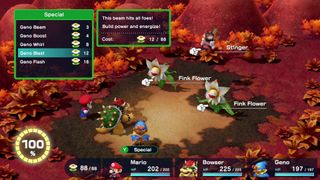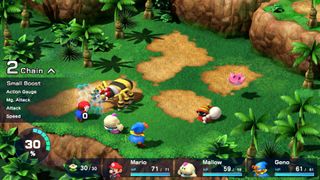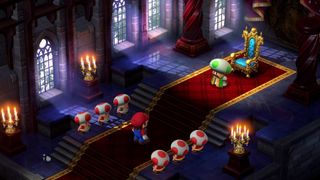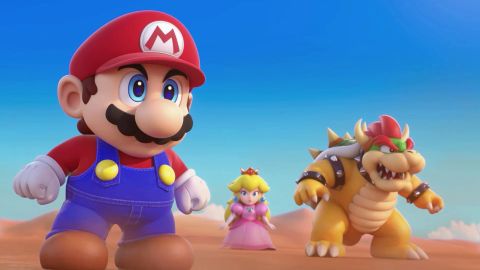GamesRadar+ Verdict
Super Mario RPG is legendary for a reason, and that's never been clearer than with this remake. It looks great and smartly evolves the original combat system to make it even more engaging. While the game can't fully escape the limitations of '90s JRPG storytelling, it still offers a zany quest well worth undertaking today.
Pros
- +
Great new visual style
- +
Smart tweaks to combat
- +
Still funny and charming
Cons
- -
Story can feel disjointed
- -
Not as robust as other Mario RPGs
Why you can trust GamesRadar+
I played the original SNES version of Super Mario RPG: Legend of the Seven Stars over a decade after its original release. By that point, it had already been eclipsed by some of the best entries in the Paper Mario and Mario & Luigi series – at least, it was in my mind, and I never quite managed to see what made the very first Mario RPG so beloved among its many fans. Now, after another decade (and then some) has passed, I finally get it, thanks in large part to an incredible remake that recontextualizes the original with beautiful visual design, smartly revamped combat, and some much-needed quality-of-life upgrades.
Release date: November 17, 2023
Platform: Nintendo Switch
Developer: ArtePiazza
Publisher: Nintendo
The original 1996 release was developed by Square, bringing the sensibilities of Final Fantasy to the Mushroom Kingdom and trading platformer action for RPG combat. If you've played any of the Mario RPGs that followed, you already know the basics here: there's a story full of charmingly goofball characters to meet, and a turn-based combat system that rewards you for perfectly timing your button presses according to the on-screen action.
The remake doesn't make any major alterations to the content of the original. You still select your destinations from a Super Mario World-style map and explore locations from an isometric overhead perspective. Those locations are effectively identical to the original SNES game, from the placement of enemies to the hiding places of useful items, to the point where you could definitely just load up an old GameFAQs walkthrough to scavenge the game's hidden corners – as I did a handful of times in my own playthrough.
Mario time battle

The big difference is that the Switch remake looks so, so much better than the original. The old art, rendered in Donkey Kong Country-style CGI sprites, does not hold up well under the spotlight of hyper-sharp modern displays, but it's been beautifully brought back to life with new properly 3D character models and environments. Everything's rich with little details, from the reflections on certain castle floors to the gorgeous animations that give characters their personality in combat.
Remake developer ArtePiazza has delivered a wonderful, loving visual upgrade that maintains the personality of the original while making massive improvements on it. It is, however, worth noting that there are a handful of areas that can cause performance dips throughout the game, but it's never an issue that gets particularly distracting – those frame rate wobbles are far less noticeable than they are in, say, the Link's Awakening remake on Switch.
Basic combat has been livened up with several new systems. You now get a chain bonus when successfully make consecutive timed actions, giving you stat boosts based on your current party makeup until that chain is broken. There's also a meter that fills based on timed action successes that you can spend to unleash a summon-style ability, with a fun little cutscene and a powerful ability to help take down foes. There are now visual indicators to help you time your action presses, and there's an even more precise bonus window for your attacks that makes them deal bonus damage to every enemy on the field.

"It's maybe the most Mario has ever felt like a psychedelic dream sequence"
These are all tiny additions that don't greatly affect the flow of combat, but they all combine to give you a pretty robust list of additional factors to consider in fights, helping to raise the stakes. In the original game, it didn't really matter if you missed one attack window, since you'd make up the damage in the next round. Now, it's heartbreaking to miss that window since you're losing all kinds of bonus stats. These are very smart alterations that help to make fights feel more robust and rewarding in the remake.
Another big difference in combat is that you can now swap party members in and out at any time, without losing a turn, even if the character you're subbing in for had been afflicted by a status effect or KO'd. That means plenty of situations that would've resulted in a total party kill are now no problem, since you can just, say, swap in Peach to start casting her revive ability when everyone else goes down. Super Mario RPG hasn't been substantially rebalanced to account for this, so the main story is substantially easier than it was the first time around.
If you want to be challenged, you'll need to either stay underleveled through the main story, or wait for the post-game content that unlocks after you beat the final boss. This is basically just a brief quest line that leads you through a handful of rematches against various toughened-up versions of previous bosses, but these fights are some of the most satisfying elements of the Super Mario RPG remake, forcing you to figure out more elaborate enemy weaknesses and adopt new strategies to take advantage of them. These fights add up to maybe an hour or two of additional content depending on how much you struggle with them, but they offer a pretty fun victory lap.
What's old is… well, still old

I've been writing a lot here about how this remake compares to the original Super Mario RPG, and not really how it works as a modern game. That's because you'd never mistake it for one. While the new visuals are great and the new combat systems make fights more engaging, this is still at its heart a SNES game – undoubtedly one of the best SNES games – and you shouldn't come in expecting something that feels as robust or substantial as something developed from scratch in the modern era.
Super Mario RPG is a bit… abstract, for lack of a better term. It's disjointed and weird, but I don't mean that in a bad way – it's maybe the most Mario has ever felt like a psychedelic dream sequence, which is saying something in a year which includes Super Mario Bros. Wonder. Characters enter and exit the story at seemingly random intervals, it's never quite clear where one story arc ends and another begins, and it's pretty easy to forget who the villain is when the plot doesn't seem particularly interested in establishing him.
Yet the feeling that you're drifting through a series of vignettes rather than embarking on a grand adventure is what gives Super Mario RPG its charm – and this is the part I missed years ago when I was comparing the SNES original to games like Paper Mario: The Thousand-Year Door.
Super Mario RPG is a sketch comedy, one that imagined a world where the Mario characters could actually be characters and not just gaming avatars. The second part of that idea is no longer novel, but the rapid-fire goofs still work. Leaping from vignette to vignette – fighting evil Power Rangers, turning Mario into a martial arts master, wondering why the hell this cloud guy is calling himself a frog – offers its own charm, helped along by what's still genuinely funny dialog.
This Switch remake does an incredible job of sanding off the rough edges of the original to make that charm shine through in 2023. Other Mario RPGs have offered more substantial experiences that better combine goofy gags with robust role-playing adventures, but the zany shenanigans of Super Mario RPG are still worth enjoying today, and the remake is easily the absolute best way to do just that.
Disclaimer
Super Mario RPG was reviewed on Nintendo Switch, with a code provided by the publisher.
More info
| Genre | JRPG |
| Description | The last hurrah of Square and Nintendo's friendship before Square went with Sony, this was Mario's first of many amazing adventures in the RPG genre. |
| Platform | "SNES","Wii" |
| US censor rating | "Everyone","Everyone" |
| UK censor rating | "3+","3+" |
| Release date | 1 January 1970 (US), 1 January 1970 (UK) |

Dustin Bailey joined the GamesRadar team as a Staff Writer in May 2022, and is currently based in Missouri. He's been covering games (with occasional dalliances in the worlds of anime and pro wrestling) since 2015, first as a freelancer, then as a news writer at PCGamesN for nearly five years. His love for games was sparked somewhere between Metal Gear Solid 2 and Knights of the Old Republic, and these days you can usually find him splitting his entertainment time between retro gaming, the latest big action-adventure title, or a long haul in American Truck Simulator.

